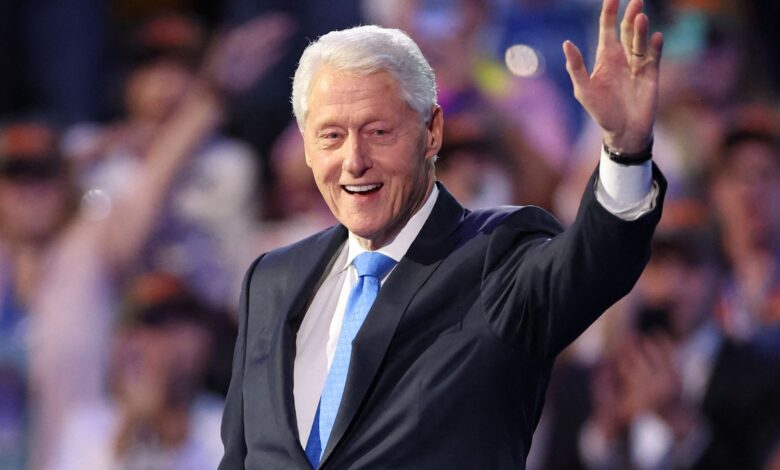Bill Clinton: Reflections on Age and Legacy
Bill Clinton: Reflections on Age and Legacy

As of 2024, Bill Clinton, the 42nd President of the United States, is 78 years old. Born on August 19, 1946, in Hope, Arkansas, Clinton has lived through and influenced significant moments in American and world history. His age, while a marker of time, also symbolizes the extensive experience and perspective he brings to contemporary discussions on politics, leadership, and the evolution of American society. This article reflects on Clinton’s life, his contributions, and how his age shapes his current role in public life.
A Life of Public Service
Bill Clinton’s journey in public service began at a young age. After graduating from Georgetown University, attending Oxford University as a Rhodes Scholar, and earning a law degree from Yale University, he quickly ascended the ranks of political leadership. At just 32, Clinton became the Governor of Arkansas, serving from 1979 to 1981 and again from 1983 to 1992. His youth and dynamism made him a standout figure in American politics, and by 1992, at the age of 46, he was elected President of the United States.
During his two terms in office, Clinton oversaw a period of significant economic prosperity, marked by budget surpluses and technological advancements. His administration was also characterized by efforts to reform welfare, improve healthcare, and promote peace in regions like the Balkans and the Middle East. Clinton’s leadership style was pragmatic, often seeking middle ground in a polarized political environment.
The Evolution of a Political Icon
As Clinton has aged, his role in public life has evolved. No longer the young, energetic governor or the charismatic president, Clinton now occupies a position of elder statesman. His age brings with it a wealth of experience, allowing him to offer insights and advice that are rooted in decades of political and social change.
Clinton’s post-presidential years have been marked by continued public service, most notably through the Clinton Foundation, which he established in 2001. The foundation focuses on global issues such as health, economic development, and climate change. His work in these areas has garnered international recognition and further solidified his legacy as a global leader.
However, age has also brought challenges. In 2004, Clinton underwent quadruple bypass surgery, and in 2010, he had two stents implanted in a coronary artery. These health issues have inevitably slowed him down, but they have also underscored the resilience and determination that have defined his life. Clinton’s health is a reminder of the toll that years of public service and stress can take, but it also highlights his ability to overcome adversity.
Age and Influence in the Modern Era
In recent years, discussions about age and leadership have become increasingly relevant in American politics. With several high-profile politicians and leaders well into their 70s and 80s, the conversation around age, health, and the ability to lead has taken center stage. Clinton, having stepped back from the day-to-day political fray, serves as a case study in how former leaders can continue to influence public discourse long after their time in office has ended.
At 78, Clinton remains an active figure in Democratic Party politics, often offering his perspective on current issues and candidates. His endorsement is still sought after, and his speeches at Democratic National Conventions continue to draw attention. Yet, unlike his younger years, Clinton’s influence today is more about guiding and mentoring the next generation of leaders rather than directly shaping policy.
His age also affords him the ability to reflect on his presidency and the broader trajectory of American politics. In various interviews and public appearances, Clinton has spoken candidly about the successes and failures of his time in office, offering a nuanced view that only comes with time and experience. His reflections are not just about the past but also provide valuable lessons for the present and future.
The Role of an Elder Statesman
As one of the few living former presidents, Clinton occupies a unique space in American political life. Alongside his contemporaries, such as George W. Bush and Barack Obama, Clinton’s role is often that of a unifying figure, someone who can rise above the partisan battles of the moment to offer a broader, more inclusive vision for the country.
In this role, Clinton’s age is an asset. His decades of experience allow him to speak with authority on issues ranging from economic policy to international relations. His insights are not just those of a former president but of someone who has lived through and influenced critical moments in modern history.
Clinton’s elder statesman status also means that he is often called upon to represent the United States at international events and in diplomatic contexts. His age and experience lend gravitas to these occasions, reinforcing his role as a respected figure on the global stage.
Looking Forward
As Bill Clinton approaches his 80s, the question of his legacy becomes increasingly pertinent. How will history remember him? What lessons can future generations learn from his life and career?
Clinton’s legacy is multifaceted. His presidency is often remembered for its economic achievements and efforts to reform key aspects of American society. However, it is also marked by controversy, particularly the impeachment proceedings in 1998 related to his affair with Monica Lewinsky. These complexities are part of what makes Clinton such a compelling figure in American history.
His age allows for a deeper understanding of these complexities. As time passes, the nuances of his presidency become clearer, and his contributions are seen in a broader context. Clinton’s ability to remain relevant and influential, even as he ages, is a testament to his enduring impact on American politics.
Conclusion
Bill Clinton’s age is more than just a number; it is a reflection of a life lived in the public eye, marked by significant achievements and challenges. At 78, he continues to be a vital presence in American and global affairs, offering insights that are shaped by decades of experience. As he looks back on his life and career, Clinton’s reflections provide valuable lessons for current and future leaders. His journey from a young governor in Arkansas to a respected elder statesman is a reminder of the power of resilience, adaptability, and lifelong public service.


